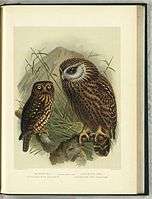Walter Buller
| Sir Walter Buller KCMG | |
|---|---|
_-_Sir_Walter_Lawry_Buller.jpg) Portrait of Sir Walter Buller (1903) | |
| Born |
Walter Lawry Buller 9 October 1838 Pakanae, Hokianga, New Zealand |
| Died |
19 July 1906 (aged 67) Fleet, Hampshire, England |
| Known for | New Zealand ornithology |
Sir Walter Lawry Buller KCMG (9 October 1838 – 19 July 1906) was a New Zealand lawyer, naturalist, and dominated in the field of New Zealand ornithology. His book, A history of the birds of New Zealand, first published in 1873, was published as an enlarged version in 1888 and became a New Zealand classic.
Biography
Buller was born at the Wesleyan mission, Newark at Pakanae in the Hokianga, the son of a Cornish missionary, Rev. James Buller, who had helped convert the people of Tonga to Methodism. He was educated at Wesley College in Auckland. In 1854, he moved to Wellington with his parents, where he was befriended by the naturalist William John Swainson. In 1859 he was made Native Commissioner for the Southern Provinces. In 1871 he travelled to England and was called to the bar at the Inner Temple. Three years later he returned to Wellington and practised law.[1]
In 1862, he married Charlotte Mair at Whangarei. They were to have four children.[1]
Buller was the author of A History of the Birds of New Zealand (1872–1873, 2nd ed. 1887–1888), with illustrations by John Gerrard Keulemans and Henrik Grönvold. In 1882 he produced the Manual of the Birds of New Zealand as a cheaper, popular alternative. In 1905, he published a two-volume Supplement to the History of the Birds of New Zealand, which brought the work up to date.
Buller was appointed Companion of the Most Distinguished Order of St Michael and St George in 1875.[1] In November 1886, he was promoted to Knight Commander.[2] Buller helped establish the scientific display in the New Zealand Court at the World's Fair in Paris and was decorated with the Officer of the Legion of Honour by the President of France in November 1889.[3][4]
He had several unsuccessful attempts at entering Parliament. He contested the general elections of 1876 (Manawatu; beaten by the incumbent Walter Johnston)[5][6] and 1881 (Foxton, where he came fourth of six candidates),[7][1] and the 1891 by-election in the Te Aroha electorate (where he was beaten by William Fraser).[8]
He emigrated to England and died at Fleet in Hampshire on 19 July 1906.[1]
Wellington playwright Nick Blake authored a play on Buller's life, Dr Buller's Birds, which had its debut at the 2006 NZ International Arts Festival.[9]
List of honours
-
 KCMG
KCMG -
 Officier de la Légion d'Honneur (France)
Officier de la Légion d'Honneur (France) -
 Officier de la Palmes académiques (France)
Officier de la Palmes académiques (France)
Eponyms
Species named after Walter Buller include Thalassarche bulleri (Buller's albatross) and Puffinus bulleri (Buller's shearwater).[10]
-

Book cover - A History of the Birds of New Zealand by Sir Walter Lawry Buller, Illustrated by J. G. Keulemans, 2nd edition, Published 1888.
-

Illustrations of the morepork (left) and the extinct laughing owl (right) by John Gerrard Keulemans in Buller's A History of the Birds of New Zealand. 2nd edition. Published 1888.
-

Pachyornis elephantopus ("Heavy-footed Moa")
original caption: Leg of Dinornis elephantopus (front view: three-fourts natural size)
References
- 1 2 3 4 5 Galbreath, Ross. "Buller, Walter Lawry – Biography". Dictionary of New Zealand Biography. Ministry for Culture and Heritage. Retrieved 23 October 2012.
- ↑ The London Gazette: no. 25642. p. 5443. 9 November 1886. Retrieved 6 March 2015.
- ↑ Brewer, M., 'New Zealand and the Legion d'honneur: Officiers, Commandeurs and Dignites', The Volunteers: The Journal of the New Zealand Military Historical Society, 35(3), March 2010, p.136.
- ↑ 'Death of Sir Walter Buller, A noted Ornithologist', Evening Post, 20 July 1906, p.6.
- ↑ "Wellington". Wanganui Chronicle XIX (2954). 13 January 1876. p. 2. Retrieved 30 January 2013.
- ↑ "The Manawatu Election". Evening Post XIII (8). 11 January 1876. p. 2. Retrieved 30 January 2013.
- ↑ "Foxton". Thames Star XII (4043). 13 December 1881. p. 2. Retrieved 31 January 2013.
- ↑ "Te Aroha Election". Thames Star. XXIII (6930). 10 July 1891. p. 2. Retrieved 29 June 2011.
- ↑ "Play shows bird man's treachery". nzherald.co.nz. 25 February 2006. Retrieved 22 October 2010.
- ↑ Buller, Walter (1888). "Puffinus Bulleri. — (Buller’s Shearwater.)". A History of the Birds of New Zealand. London. Retrieved 13 November 2014.
External links
| Wikimedia Commons has media related to Walter Lawry Buller. |
- New Zealand National Library Sir Walter lawry Buller
- Encyclopaedia of New Zealand 1966: Sir Walter Lawry Buller
- Illustrations from History of the birds of New Zealand (1873 edn.)
- Illustrations from the Supplement to the second edn. of History of the birds of New Zealand
|